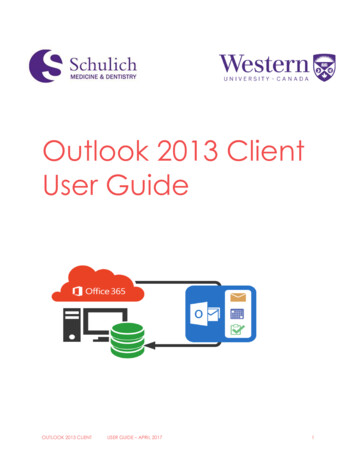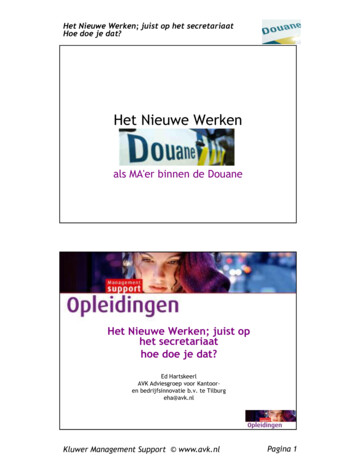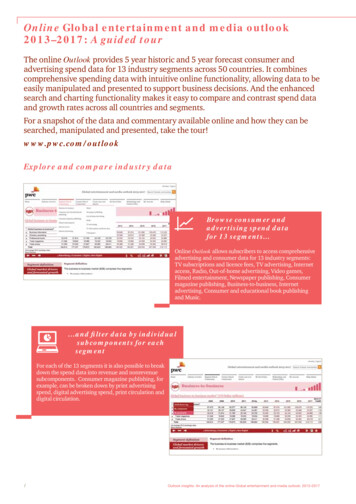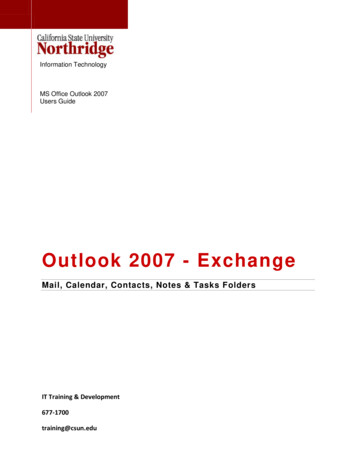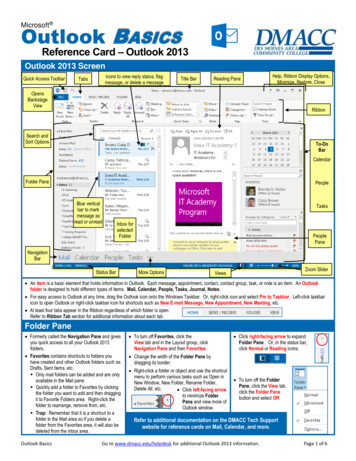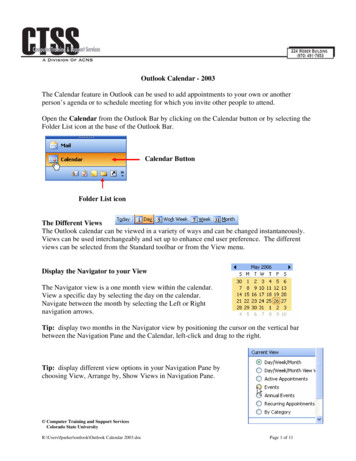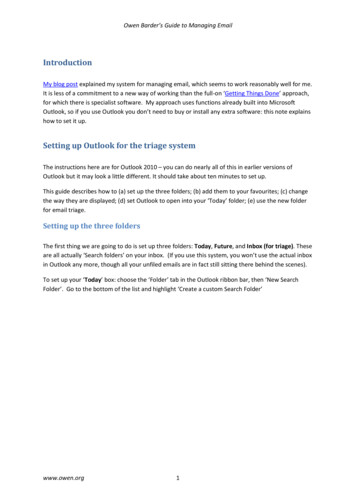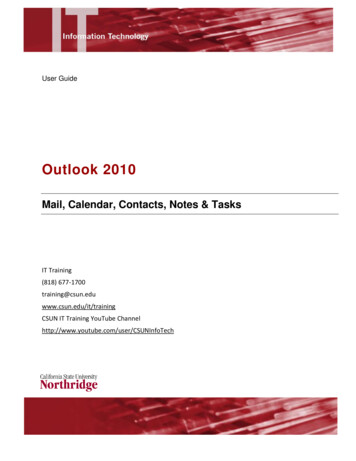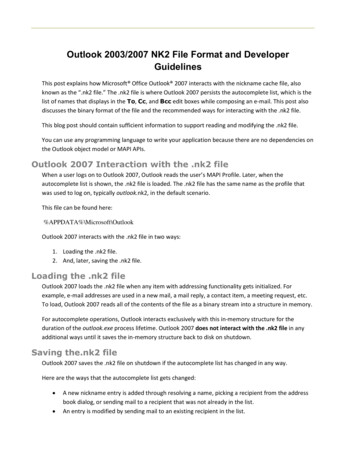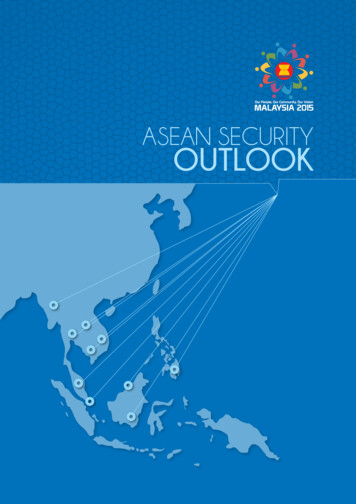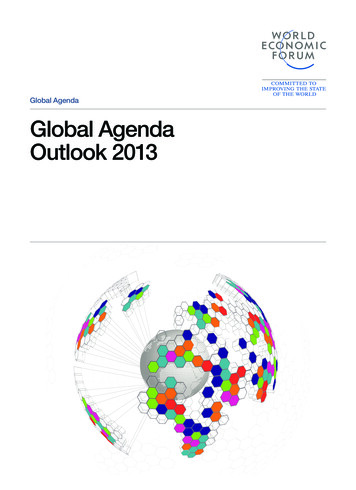
Transcription
Global AgendaGlobal AgendaOutlook 2013WEF-121228-OGA-HD2.indd 111.01.13 07:37
ContributorsReport TeamLee Howell, Managing Director, Member of the ManagingBoard, World Economic ForumMartina N. Gmur, Senior Director, Head of the Network ofGlobal Agenda Councils, World Economic ForumPeter Bisanz, Associate Director, Head of Outreach,Global Agenda Councils and Risk Response Network,World Economic ForumLiana Melchenko, Associate Director, Head of KnowledgeManagement, Global Agenda Councils, World EconomicForumIsabel de Sola, Senior Knowledge Manager, GlobalAgenda Councils, World Economic ForumShubhra Saxena Kabra, Knowledge Manager, GlobalAgenda Councils, World Economic ForumBenjamin Prampart, Senior Nomination Associate, GlobalAgenda Councils, World Economic ForumStefan Hall, Research Analyst, Global Agenda Councils,World Economic ForumKyle Packer, Digital Content Associate and SurveyAnalyst, Global Agenda Councils, World Economic ForumSpecial thanks to the entire Global Agenda Council teamProduction TeamKamal Kimaoui, Director, Head of Production andDesign, World Economic ForumYoren Geromin, Designer, Kissing KouramiEditorialMichael Hanley, Editorial Director, World EconomicForumAnn Brady, Associate Director, Head of Editing, WorldEconomic ForumFabienne Stassen, Director, EditOrProofAuthorsAlex Elliott, WriterDavid Roberts, WriterVisualization and Digital ContentPhillip Tiongson, Principal, Potion DesignEmmi Laasko. Designer, Potion DesignEdyta Lewicka, Designer, Potion DesignKatherine Keane, Producer, Potion DesignWorld Economic ForumGenevaCopyright 2013 by the World Economic ForumPublished by World Economic Forum, Geneva,Switzerland, 2013www.weforum.orgAll rights reserved. No part of this publication may bereproduced, stored in a retrieval system, or transmitted,in any form or by any means, electronic, mechanical,photocopying, or otherwise without the priorpermission of the World Economic Forum.ISBN-13: 92-95044-51-7 / 978-92-95044-51-7World Economic Forum91-93 route de la CapiteCH-1223 Cologny/GenevaSwitzerlandTel.: 41 (0) 22 869 1212Fax: 41 (0) 22 786 GA-HD2.indd 211.01.13 07:37
Contents2Contributors3Preface4Introduction7The Future of Globalization10The Continued Quest forEconomic Growth13Geopolitical Uncertainties16Thriving in a Hyperconnected World19The Post-2015 DevelopmentAgenda21Restoring Values24About the Network of GlobalAgenda Councils26Portfolio of CouncilsPrefaceWhat is the future of globalization? How can sustainable globaleconomic growth be achieved? What are the major geopoliticaluncertainties for 2013? These are some of the questions at thetop of the agenda of many global leaders and decision-makers.They formed the main topics of discussion over the past fewmonths among the 1,500 global experts from the Network ofGlobal Agenda Councils, over 900 of who met face-to-faceduring the Summit on the Global Agenda 2012 in Dubai.The most compelling of these debates are highlighted in thisreport, with the intention of broadening our outlook for 2013. TheGlobal Agenda Outlook 2013 examines the existing claims anddiscussions from the perspective of some of the world’sforemost thought leaders, and complements these insights witha wealth of quantitative data from surveys conducted across thisglobal network of experts. The result is a much morecomprehensive assessment about what to expect in 2013 andbeyond. In short, we see this report as a briefing document fortoday’s leaders.The Global Agenda Councils will continue to work together inthe coming months, producing ideas and recommendations toaddress the key challenges of our time. The World EconomicForum is committed to integrating the outcomes of their workinto its activities, including at the upcoming Annual Meeting inDavos-Klosters 2013, to ensure that they find their way intoglobal decision-making processes.The World Economic Forum would like to express its sinceregratitude to all the Members of Global Agenda Councils, whoseconversations at the Summit in Dubai and in their virtualmeetings are the foundations of this report. Special thanks aredue to the main authors of the chapters for their contributions.I hope that the Global Agenda Outlook 2013 provides you withvaluable insights to guide your decision-making in the comingyear. I invite you to continue these debates with Members of ourNetwork, to share your ideas and develop concrete action planswhich can help to shape a better future.Get involved cilsMartina N. GmürSenior Director, Head of the Network of Global Agenda Councils,World Economic ForumGlobal Agenda Outlook 2013WEF-121228-OGA-HD2.indd 3311.01.13 07:37
-- A theme common to all thesediscussions is the increased role oftechnology in 2013 and its associatedrisks. Chapter 4 captures the mainopportunities and risks faced by anincreasingly hyperconnected world,not only what it means for citizens, butalso for the urban environment oftomorrow.-- Chapter 5 highlights the complexitiesof the post-2015 development agendaand examines how economicdevelopment and environmentalsustainability can be balanced.-- Chapter 6 – restoring our value system– seeks to bring all the pieces together,with a focus on revisiting core values indecision-making and leadership.IntroductionThe Global Agenda Outlook 2013 is apublication of the Network of GlobalAgenda Councils, a unique network ofover 1,500 of the world’s most relevantexperts from academia, business, civilsociety, government and internationalorganizations. This report providesinsights and views into pressing globalissues, through a collection of surveyresults and interactive discussionsamong Members of the Network. Thesurvey data combines 1500 responsesfrom GAC Members and industryleaders.The Global Agenda Outlook 2013 isstructured around six chapters, eachtackling a specific issue: globalization,economic growth, geopolitical risks,hyperconnectivity, the post-2015development agenda, and values. Eachchapter is intended to offer readers ataste of a conversation between twoexperts, complemented by data fromthe Global Agenda Survey.-- Chapter 1 focuses on the effects ofglobalization and touches on incomeinequality, employment, technologyand global governance.-- Chapter 2 concentrates on an issuethat has dominated discussions for thepast five years – economics, and theprospects of continued economicgrowth given the uncertain times.-- Chapter 3 sheds light on changingregional dynamics and potential futurethreats by analysing some of theworld’s high-risk geopolitical situations.4The chapters follow three distinctformats, reflecting the variety andrichness of the conversations that tookplace at the Summit on Global Agenda2012. The chapters on globalization,economic growth and hyperconnectivityare presented as expert question-andanswer sessions. The chapters on thepost-2015 agenda and on values offerexpert views in sharp and succinctcounter-pieces. Finally, the chapter ongeopolitical risks is designed as a “fly onthe wall” vignette, in which listeners havedropped into a conversation betweentwo experts.Most urgent issues to address*14% Unstable Global Economy11%% Eurozone Fragility10% Financial System Instability9% Widening Income Inequality9% Persistent Structural Unemployment8% Global Leadership Vacuum8% Climate Change Adaptation7% Economic Driven Social Unrest6% Natural Resource Scarcity6% Chronic Fiscal Imbalances4% Shifting Balance of Power4%Rising Influence of Emerging Economies2%Hyperconnectivity1%Generational Shift in Values1%Internet Governance*The level of urgency was ranked on a top 5 scaleduring a knowledge capture session in DubaiGlobal Agenda Outlook 2013WEF-121228-OGA-HD2.indd 411.01.13 07:37
All these discussions have beensupplemented with updated data basedon the opinions of Members of theNetwork of Global Agenda Councils,gathered before and during the Summiton the Global Agenda 2012 in Dubai,featuring about 1500 responses. Aninitial survey among the Global AgendaCouncils community, conducted inJune-July 2012 and updated inNovember 2012 during the Summit,sought to identify global trends for 2013,while the pattern of transition from atrend ranking to an issue of urgency thatemerged during the Summit offersinsights into participants’ underlyingconcerns. When data and debatescome together, what emerges is anoutlook with a number of clearly definedthemes to watch in 2013.Alongside continuing concerns aboutunstable global economic prospects(concerns somewhat mitigated by asense of reserved optimism about thecapacity of the eurozone to avertdisaster), one particularly prevalenttheme is the ever-growing significanceof the economic rise of China. Theinfluence this might have on a globalscale remains to be determined. It willdepend as much on the country’sinternal progress (in areas such asmarket reforms and combating incomedisparity) as on its external focus (andthe diplomatic decisions the country hasto take in areas as diverse as East Asiaand the Middle East). The new Chineseleadership, it seems, has come to powerat a potentially crucial moment for thecountry and the world at large.The ranking of the trends on the left-hand side is taken from the initial online survey.The right-hand side shows a follow-up ranking, taken during a knowledge capturesession at the Summit on the Global Agenda in Dubai.Initial Survey (July 2012)Dubai follow-up Survey (November 2012)14%% Eurozone Crisis12% Uncertain economic outlook12%% Uncertain Economic Outlook9% Eurozone crisis7% Digital / Communications6% Growth / Stabilization5% Scarcity of Resources6% Global Leadership Vacuum5% Global Power Shifts6% Inequality5% Global Leadership Vacuum5% Global power shifts5% Global interdependency5% Climage change4% Financial System Instability5% Financial system4% Climate Change5% Unemployment3% Public Debt Crisis5% ionOverall measurement in the confidence of global leadership to solvedifferent issues, taken during a knowledge capture session at theSummit on the Global Agenda 2012 in Dubai.Very ConfidentConfidentNeutralNot ConfidentNot at all Confident%60504030The widening global gap between richand poor is also a concern – from fearsabout high levels of unemployment inthe (demographically young) Arab worldthreatening social cohesion, tofrustration at the high number of peoplewho continue to live on less than US 2a day, even as the landmark globaldevelopment year of 2015 approaches.Such inequality may sometimes be seenas an inevitable consequence ofglobalized capitalism; ignoring it,however, brings huge risk.20100Major SystemicFailureChronic FiscalImbalancesSevere IncomeDisparitiesPersistent StructuralUnemploymentGlobal Agenda Outlook 2013WEF-121228-OGA-HD2.indd 5511.01.13 07:37
Not giving sufficient attention to thepossibilities and potential risks of newtechnology is another emerging risk. Ifnew technology is the best hope forsustained global economic growth, italso needs to be pursued and exploitedwith care both for people (changingtechnology requires a changinginternational labour market) and theplanet. The spectre of man-madeclimate change – and the apparentinability of society to reverse it – remainsin the background of many of thediscussions that follow. Meanwhile, thebenefits of an increasinglyhyperconnected world for individualsand society are alternately doubted andchampioned, thereby underlining thecomplexity of an issue landscape thatranges from cybershocks to smartcities.One theme that recurs more than anyother is the need for clear, dynamicleadership in a fast changing world.Given (as one participant noted) thatmost of today’s leaders – political,business, academic and society – grewup in a vastly different world fromtoday’s, it is perhaps no surprise thatleadership remains the biggestchallenge of all for 2013 and beyond.Our interactive website and datavisualizations feature more unique dataand content, as well as the extendedtranscripts of the conversations (www.weforum.org/gac).How will free-market capitalism be seen in 5 years?PositiveNeutralNegativeBy Stakeholder%50403020100BusinessCivil Society &OtherBy sity &Think TankLatin AmericaMiddle East/North AfricaNorth Do you feel that the recent leadership change in China will improve or worsen thefollowing issues?*Greater reformof SOEsimproveChinese marketopeningInternational use ofChinese currencyLess incomedisparities in ChinaAsiaAsiaMiddle East/North AfricaAsiaEuropeLatin AmericaLatin aranAfricaSub-SaharanAfricaSub-SaharanAfricaMiddle East/North AfricaNorth AmericaNorth AmericaworsenMiddle East/North AfricaAsiaNorth AmericaLatin AmericaLatin AmericaEuropeMiddle East/North AfricaNorth America*Differences in responses between regions are relative.6Global Agenda Outlook 2013WEF-121228-OGA-HD2.indd 611.01.13 07:37
The Future of GlobalizationAs the pace of globalizationcontinues to increase, newopportunities and challengeswill arise for leaders andcommunities. Whileglobalization has broughtimmense benefits to manysectors, certain countriesand individuals remainvulnerable, whose interestsshould be protected andpromoted. How cansocieties best approach thechallenges this presents?The Outlook on the Global Agendabrought together Pascal Lamy (left),Director-General, World TradeOrganization, and Kevin Rudd (middle),Prime Minister of Australia (2007–2010)and current Member of Parliament.Ngaire Woods, Dean of the BlavatnikSchool of Government, University ofOxford, moderated the discussion.Q: What are the best and worst thingsabout globalization?Kevin Rudd: The spreading of wealth isthe key benefit in my view: globalization islifting economic growth rates and livingstandards around much, though not all,of the developing world, and indeveloped countries as well.The worst thing is the disconnectbetween the volume of activity that nowrequires regulation at a global level andnational political systems incapable ofagreeing on global forms of governanceto do that.Pascal Lamy: The best thing to come outof globalization has been povertyreduction, and the worst is inequality.Because globalization is extremelyefficient, inequalities within countries andamong countries have increased: povertyreduction is absolute, inequality is relative.And if we don’t change these inequalities,the social reaction will endangerglobalization. I come at this issue as aperson from the left, and think inequalitiesin themselves should be addressed. Buteven if I came from the right, pushingglobalization for efficiency, I would want toaddress the problem, so that populist,sovereignist, isolationist reactions do nothinder the positive side of globalization.In your region, will advancing globalization have a positive or negative impact overall?AsiaEuropeLatin AmericaMiddle East/North AfricaNorth AmericaSub-Saharan %0%9%0%Global Agenda Outlook 2013WEF-121228-OGA-HD2.indd 7711.01.13 07:37
How confident are you about the current capacities of global leadership to solvesevere income disparities?North AmericaEuropeAsiaLatin AmericaSub-Saharan AfricaMiddle East/North Africa19% 18%11%1% 2% 1%0%VeryConfident4%Confident5% 5% 6%1% 1% 1%19%NeutralQ: How can globalization be made “safe”for the people who are being made lessequal?Kevin Rudd: Inequality is an inevitableconsequence of capitalism. The key ismanaging the level of inequality. Whetheryou come from the perspective of equalityof opportunity or enlightened self-interest,the net consequence of both is a level ofsocial intervention. I do not support theultimate neo-liberal form of globalizationbut one based on a social democraticconditionality. That means ensuring thatthose who are temporarily losers aresupported by adequate safety nets andable to readjust to other forms ofemployment.I think waiting for the magical marketplaceto resolve these questions is selfdelusional. There are also economicdimensions to this. The net impact ongovernment budgets of large-scale,long-term unemployment in terms of lostrevenue through collapsing wages issignificant – far better to be more radicalin your interventions to get people back towork.Pascal Lamy: In Europe, Nordic countrieshave addressed inequality reasonably well,southern countries have not. I think it isnecessary and can be done. Governmentsneed to address their debt overhang, whichwill take time, and make the necessarystructural reforms to grow to their potential.At an international level, we need properglobal governance that has the necessarytools, power and intervention capacity torecreate a more level playing field.82% 3% 1%54%NotConfident8% 7%5%1% 1% 1%23%Not at allConfidentQ: Is there any part of globalization thatyou think is improving the ability ofindividuals to hold those in power toaccount?Pascal Lamy: Technology, the infrastructure of globalization, has huge empowerment capacity, and it doesn’t makegovernments’ lives easier. Governmentswill regulate globalization if their constituencies give them the mandate to do so– if governments don’t do it, it is becausethey don’t presently have the necessarypolitical energy at home. The danger fordemocracy comes from globalization notbeing harnessed, because people believethere is nothing they can do.Kevin Rudd: The essence of globalizationis the contraction of time and space ininternational transactions through theplatform of new technologies. Citizens,including some of those in the poorestcountries, are now globally wired. Butmanaging the business of existingdemocratic constituencies throughregular election processes, and the newconstituencies in a more chaotic formthrough new technologies, makes thebusiness of democratic governance morecomplex than ever.Q: What is the most important element ofcooperation needed to make internationalglobalization safe?to the global economy right now, and toadd new activity in a way that wouldn’tcost an arm and a leg, is open trade. If thetwo leading global economic powers ofthe Chinese and Americans chose tomake this work tomorrow, it could.Pascal Lamy: I think the environmentalsustainability issue is not beingadequately addressed at present. I amnot saying we don’t have problems intrade – we do need to keep opening it,and the Doha Round was and still is arecipe for doing that. But it is not the onlyrecipe, there are many – if we revamp, forexample, the information technologyagreement, we could bring a lot moreopen trade. With trade, so far we’vesucceeded in not receding – we haven’tdamaged the system. On theenvironment, we are moving this planetbackwards in terms of well-being, andthat’s why I think the environment shouldbe the priority.The danger for democracycomes from globalization notbeing harnessed becausepeople believe there is nothingthey can do.Pascal LamyKevin Rudd: A core problem is the WTO’sinability to deliver a Doha Round – the oneeasy route to providing an extra 0.5% oreven 1% in global growth in a growthchallenged world. It’s not the WTO’s fault;it’s the inability of national governments toallow that institution to work by giving it aneffective political mandate. The mostbasic ingredient to globalization is to haveopen economies, and the most importantsub-element of that is open lines ofcommerce. One way to add confidenceGlobal Agenda Outlook 2013WEF-121228-OGA-HD2.indd 811.01.13 07:37
Q: Is the G20 the place to get the world tofocus on climate change?Pascal Lamy: After its second meeting,the G20 decided not to talk about theenvironment anymore – it was too divisive.But we all know the basic components ofan environmental agreement have to takeplace within the G20. This is where thecountries that are preventing theagreement happening – because theydisagree – are all around the table.Kevin Rudd: Global institutions providethe mechanism to make globalizationwork but they require national politicalgovernments to work, too. If a largeenough grouping within the G20 said “thisneeds to be done”, it could be. The G20 isnot just a clearing house, but amarshalling mechanism.Q: What is the shock you most fear in2013?Pascal Lamy: At the low probability end,but with a very high damaging capacity, iscyber risk. We who follow politics closelyknow that there is a much higher risk fromthat side than is acknowledged in publicdebate. Political instability in the MiddleEast may have a lower immediate globalimpact, but a higher probability to createshocks.Q: What would you put top of the agendafor leaders to debate at the WorldEconomic Forum Annual Meeting inDavos in 2013?Kevin Rudd: In terms of the sustainabilityof globalization, it would be a newstrategic roadmap for China and the US.Then, to work on things that they canagree on – globally that would bereaching a compact on delivering Doha,and climate change; and within ourregion, Asia Pacific, beginning to work outthe security rules of the road in East Asia.Pascal Lamy: The crucial issue is for eachto make an effort to understand wherethe other is coming from. A radical recipewould be for each of these leaders tocome to Davos with an anthropologist –the leader saying nothing, theanthropologist explaining to the others thespecificities of his or her country. I thinkonce they’d done that, the leaders wouldunderstand each other better andprobably have a much higher capacity toconverge on issues.Kevin Rudd: A cybersecurity attack thatcollapsed platforms for engagement in aglobal context would be catastrophic.Do you agree or disagree that human development is becoming more ecologicallysustainable?*Strongly AgreeAgreeDisagreeStrongly ionalOrganization6%30%50%50%1414%Civil Society& 1%48%48%8%8%University& Think Tank*We grouped respondents according to their stakeholder groups.One way to add confidence tothe global economy, and toadd new activity in a way thatwouldn’t cost an arm and aleg, is open trade.Kevin RuddInsights revealed during a sessionentitled “The Impact of De-globalization”during the Summit on the Global Agenda2012:1-- Globalization and easier access toinformation and disclosure are too oftenseen as solely positive, whereas they arealso creating a world that is more volatilewith increased economic uncertainty.-- In the current volatile environment,globalization and de-globalization mayalternate, and even co-exist. Acrosslocalities, countries, regions, but alsosectors and industries, globalizationand de-globalization are consideredless and less mutually exclusive.-- There is a loss of trust in the ability ofgovernments, even if democraticallyelected, as well as business leaders toresolve crises and improve lives in theircommunities.-- Success of global governance as acentral pillar of globalization is muchmore outcomes-driven than processdriven. Trust will only be earned ifsolutions are delivered.-- Globalization is continuing in migration,global food production systems andthe tertiary education sector (studentflows, global outreach of universities).However, examples of de-globalizationcan be seen in the manufacturing andproduction sector.For more information on the Summit,please visit he Global Agenda Councils on Institutional GovernanceSystems, India, Geopolitical Risk, the Future of the Internet, andthe Rule of Law, among other Councils, contributed to thediscussions in this session. More information on the Network ofGlobal Agenda Councils can be found at: rience-2012.Global Agenda Outlook 2013WEF-121228-OGA-HD2.indd 9911.01.13 07:37
The Continued Quest forEconomic GrowthThe global financial crisisrevealed the interconnectednature of the world’seconomies, highlighting theneed for coordinated globalpolicy and governance. Fiveyears on, restoringsustainable economicgrowth remains a top priorityfor policy-makers around theglobe, but it remains anelusive goal. Where hasgrowth gone and how can itbe restored in today’svolatile, interconnectedworld?The Outlook on the Global Agendabrought together Michael Spence (left),William R. Berkley Professor ofEconomics and Business, NYU SternSchool of Business, and Fu Jun (middle),Executive Dean and Professor of PoliticalEconomy, School of Government, PekingUniversity. Scott Kalb, Chief ExecutiveOfficer, KLTI Advisors, moderated thediscussion.Q: Have we come to the end of the roadin terms of productivity gains available tous in developed countries?Fu Jun: To me, advanced economiesseem to have exhausted the potential ofthis historical period calledindustrialization. Beyondindustrialization, I have not beenpersuaded about additional sources ofproductivity increases in the developedworld. We’ve been told wonderful storiesabout IT and service-oriented industries.If you employ IT, will that increaseproductivity? Yes, it may, but to whatextent? We haven’t had a firm answer onthat in spite of all kinds of research. Withservice-oriented firms – investmentbanking, legal services, accountingservices, etc. – if you reconfigure assetson a global scale, will that increaseproductivity? It may, but again, to whatextent? Looking back, the efficiencyenhancement of these stories has beenexaggerated.The precondition for that, however, is torecalibrate the financial sector so that it isproportional to the real economy – andthat is a difficult policy issue, involvingboth economics and politics. Whether ornot the kind of public policies that wecurrently have would allow a country likethe US to re-industrialize with a greenerorientation is open to question.Then there’s technological progress, andhere we should be careful – that may havenegative distributional implications for theglobal economy. If we have a whole rangeof robotics to replace human labour, whatis the implication for incomeredistribution? One scenario would bethat you drive the gap between rich andpoor further apart, distorting supply anddemand and resulting in overcapacity.Now, if you have a mismatch between thesupply-side and the demand-side on aglobal scale, that’s not good for the globaleconomy.But I do see additional sources of growthbeyond industrialization in the advancedcountries. If they underwent a process ofre-industrialization – producing goodswith a greener orientation – that could bea dramatic additional source of growth.Do you agree that growth in emerging economies will compensatefor a lack of growth elsewhere?*:[YVUNS (NYLL(NYLL PZHNYLL:[YVUNS PZHNYLL 0(ZPH,\YVWL3H[PU (TLYPJH4PKKSL ,HZ[ 5VY[O (MYPJH5VY[O (TLYPJH:\I :HOHYHU(MYPJH L NYV\WLK YLZWVUKLU[Z HJJVYKPUN [V [OLPY YLNPVUZ 10Global Agenda Outlook 2013WEF-121228-OGA-HD2.indd 1011.01.13 07:37
Michael Spence: None of us ever knowswhere future growth is going to comefrom. If we were sitting here in 1980,although the Internet existed, nobodyanticipated the enormous effects it wouldhave. Long-term innovation andproductivity-induced growth rates inadvanced countries are probably 2-2.5%in real terms, and I’m not sure we have agood reason to think that will drop.When I look at the US economy, we havenanotechnology, we have much morecapable robotics, we have what’ssometimes called 3D printing and,although it may have major environmentaleffects, we have game-changingincrements in energy coming throughshale gas and oil. So, just focusing on theUS economy, I would say there are prettygood reasons to believe in future growth.And developing countries haven’t comeclose to exhausting the potential ofproductivity catch-up – so that looksgood as a growth engine for themselvesand everybody else, too.Q: Will growth be uneven in thedeveloping world?Michael Spence: The World Bankestimates that over the next 5 to 10 years,China will export something like 85-100million jobs to earlier-stage developingcountries, and that they will be replacedby higher-value-added activities. This isthe opportunity of the century for theearlier stage developing countries,because for a long time they’ve beensaying, rightly or wrongly, that they can’tcompete with China. Well, China ismoving on just like Korea did before, andnow is their chance.Fu Jun: Until recently, China’s growthstrategy has had three drivers: exports,investment and consumption. With theworld economy slowing down, exportsare out. So you have investment andconsumption. The problem withinvestment is that a high proportion ofinvestment continues to be made by thegovernment, not the private sector, andit’s not sustainable for the government toinject a lot of fiscal money into the systemlong term. So what is left is consumption.To sustain growth, China has to boostprivate consumption.If one looks at growth potentials on thesupply-side of the Chinese economy, thepicture seems clear. As long as Chinacontinues to close the technological gapwith advanced economies, there is hugepotential. However, the picture is lessclear on the demand-side. For theChinese economy to move forward in theDo you agree that the eurozone will break up in the next 3 years?*%80706050403020100AsiaStrongly AgreeAgreeEuropeLatin AmericaDisagreeStrongly Disagreeabsence of strong exports, domestically itmust have a reasonable match betweensupply-side growth potentials anddemand-side growth potentials. UnlessChina is successful in achieving that, theeconomy will be in trouble.Q: What is the proper role of the state inhelping to foster growth?Fu Jun: The ultimate source of growth istechnological progress, so if you are atthe frontier of human knowledge, youprobably need to give a bigger role to themarket as no one knows in advance whatthe next correct move is. But if you arebehind that frontier, and in the game ofcatching up, it probably makes sense togive a bigger role to government. Beingbehind, at least you have a sense ofdirection. That being said, even inemerging mark
Global Agenda Outlook 2013. The . Global Agenda Outlook 2013 is a publication of the Network of Global Agenda Councils, a unique network of over 1,500 of the world's most relevant experts from academia, business, civil society, government and international organizations. This report provides insights and views into pressing global
